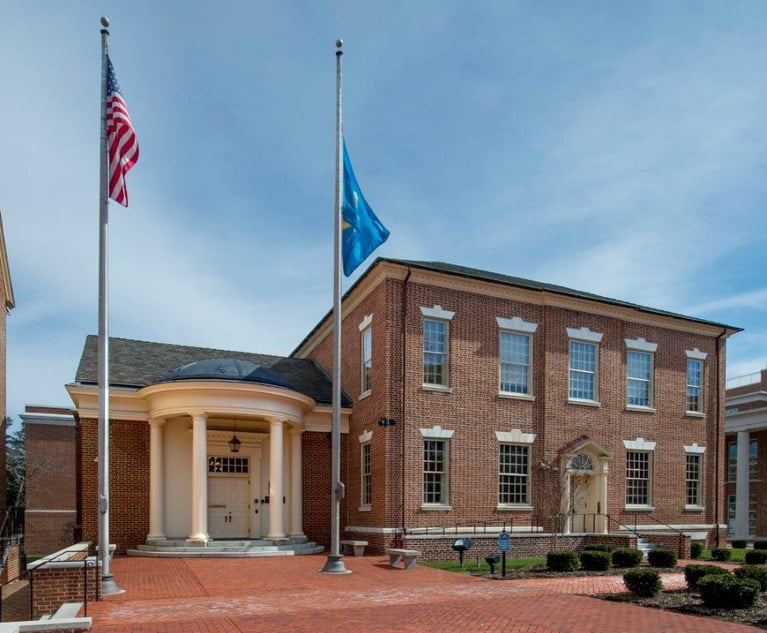Court Adopts Narrow View of Exception to Borrowing Statute
Delaware's borrowing statute provides that an action to enforce a cause of action that arises outside of Delaware cannot be brought in a Delaware court after the expiration of the applicable Delaware statute of limitations or the statute of limitations of the state or country where the cause of action arose, whichever is shorter.
March 10, 2015 at 09:36 AM
7 minute read
Delaware's borrowing statute provides that an action to enforce a cause of action that arises outside of Delaware cannot be brought in a Delaware court after the expiration of the applicable Delaware statute of limitations or the statute of limitations of the state or country where the cause of action arose, whichever is shorter. The rationale is to prevent plaintiffs from bringing suit in Delaware on claims that would otherwise be stale based on the law of the jurisdiction where the claims arose. In Saudi Basic Industries v. Mobil Yanbu Petrochemical, 866 A.2d 1 (Del. 2005), the state Supreme Court held that there were certain situations in which the borrowing statute did not apply, notwithstanding the literal language that would seem to make it applicable. The Saudi Basic case has led to some confusion regarding when the borrowing statute will not be applied according to its terms. In Trustco Bank v. Mathews, C.A. No. 8374-VCP (Del. Ch. Jan. 22, 2015), Vice Chancellor Donald F. Parsons Jr. sought to clarify this confusion.
In Saudi Basic, a Saudi corporation, Saudi Basic Industries Corp., brought a declaratory judgment action in Delaware that certain payments to it by a joint venture partnership were valid and did not violate their contract; the corporation's joint venture partners counterclaimed to recover the payments, which they contended were improper. The cause of action arose in Saudi Arabia, which had no applicable statute of limitations, but the applicable limitations period under Delaware law had run. If the borrowing statute were applied in accordance with its terms, the counterclaims would have been barred. Instead, the Supreme Court affirmed the Superior Court's determination that the claim was not barred by the borrowing statute. The court stated that applying the borrowing statute literally to require the use of Delaware's shorter limitations period would “subvert the statute's fundamental purpose by enabling [Saudi Basic] to prevail on a limitations defense that would never have been available to it had the overcharge claims been brought in the jurisdiction where the cause of action arose, i.e., Saudi Arabia.” The court explained that the borrowing statute is designed to address a specific kind of forum-shopping scenario (which the court termed the “standard scenario”) where a plaintiff brings a claim in a Delaware court that (1) arises under the law of another jurisdiction, and (2) is barred by that jurisdiction's statute of limitations but would not be time-barred in Delaware, which has a longer statute of limitations. The borrowing statute operates to prevent the plaintiff from circumventing the shorter limitations period mandated by the jurisdiction where the cause of action arose.
As Parsons recognized in the Trustco case, subsequent decisions have not consistently interpreted the holding in Saudi Basic. Some cases have interpreted Saudi Basic broadly. For example, in Bear Stearns Mortgage Funding Trust 2006-SL1 v. EMC Mortgage LLC, 2015 Del. Ch. LEXIS 9 (Jan. 12, 2015), Vice Chancellor J. Travis Laster held that under Saudi Basic, the borrowing statute does not apply if it would enable the party seeking dismissal to prevail on a limitations defense that would not have been available to it had the claims been brought in the jurisdiction where the cause of action arose. Other cases have interpreted the holding in Saudi Basic more narrowly, holding that the borrowing statute does not apply when a litigant engages in the precise practice the statute sought to prevent—i.e., forum-shopping—and would benefit unjustly from the borrowing statute's application. In Huffington v. T.C. Group, 2012 Del. Super. LEXIS 176 (Apr. 18, 2012), for example, Superior Court Judge Jan R. Jurden stated that Saudi Basic did not create a broad rule banning the borrowing statute in all situations except for the “typical scenario.” Rather, the case demonstrated the Supreme Court's unwillingness to allow the borrowing statute to be abused by a party forum-shopping to avoid an adversary's counterclaims. “At most, Saudi Basic provides a very narrow holding with respect to borrowing statute jurisprudence in that the Supreme Court recognized that applying the borrowing statute in that scenario would 'basically turn the borrowing statute on its head for the purpose for which it was enacted,'” the opinion said.
NOT FOR REPRINT
© 2024 ALM Global, LLC, All Rights Reserved. Request academic re-use from www.copyright.com. All other uses, submit a request to [email protected]. For more information visit Asset & Logo Licensing.
You Might Like
View All


Offit Kurman Fends Off Long-Running Legal Mal Suit Over Del. Bankruptcy Litigation Fallout
3 minute read
Richards, Layton & Finger Director Elected a Fellow of the American College of Governance Counsel
1 minute readTrending Stories
- 1A&O Shearman Adopts 3-Level Lockstep Pay Model Amid Shift to All-Equity Partnership
- 2A RICO Surge Is Underway: Here's How the Allstate Push Might Play Out
- 3The Law Firm Disrupted: Playing the Talent Game to Win
- 4Data-Driven Legal Strategies
- 5Preparing Your Law Firm for 2025: Smart Ways to Embrace AI & Other Technologies
Featured Firms
Law Offices of Gary Martin Hays & Associates, P.C.
(470) 294-1674
Law Offices of Mark E. Salomone
(857) 444-6468
Smith & Hassler
(713) 739-1250






